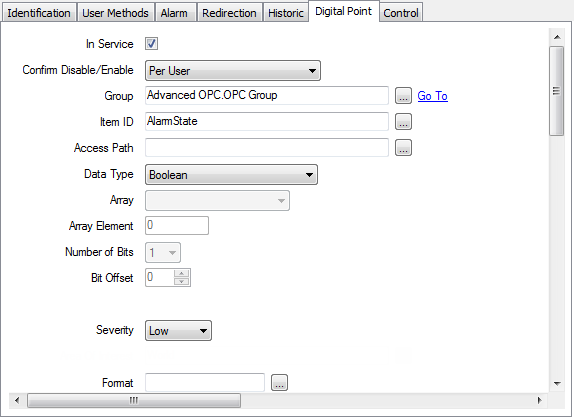Use an Advanced OPC Digital Point to map an item within the OPC DA server onto a digital point in the ClearSCADA database. The item should have an appropriate data type for a digital point.
Configure the properties of each digital point using the fields on the Advanced OPC Digital Point Form.

This section covers configuration of the digital-specific properties on the Digital Point tab of the Form.
Use the Digital Point tab to:
- Configure Common Point Properties.
- Configure the Number of Bits (see Define the Number of Bits for Digital Points in the ClearSCADA Guide to Core Point Configuration)
NOTE: This does not apply to a Boolean data type which are fixed as 1 bit. You can only define the number of bits for integer data types.
The Bit Offset (and Number of Bits) are used to mask out part of the item's value to determine the value of the point.
Enter the lowest (starting) bit of the point. With a multi-bit point, the bits have to be consecutive within the data (for example, a 2-bit digital might use bits 5 and 6, where bit 5 would be the starting bit).
NOTE: The Item should have an integer data type. The maximum offset is determined by the 'size' of data type and the number of bits.
- Define the format of displayed value (see Define the Format of a Digital Point’s Values in the ClearSCADA Guide to Core Point Configuration)
- Configure the states for the point (see Configure Digital Point States).
- Define whether a Digital Point can be Overridden in the ClearSCADA Guide to Core Point Configuration)
- Configure Synchronous Polling.
NOTE: This section can only be configured if the servers associated with this point are configured with a synchronous read type.
- Configure Confidence Polling.
- Configure Configure Point Sampling (OPC DA 3.0 only)
- Define a Digital Point’s Trend Settings in the ClearSCADA Guide to Core Point Configuration).
For information on the Control tab, see Define the Control Settings for a Digital Output Point in the ClearSCADA Guide to Core Point Configuration and see Update an Output Point Value on Successful Action.
Properties on other tabs are common to many points, see Tabs on Point Forms in the ClearSCADAGuide to Advanced Drivers.